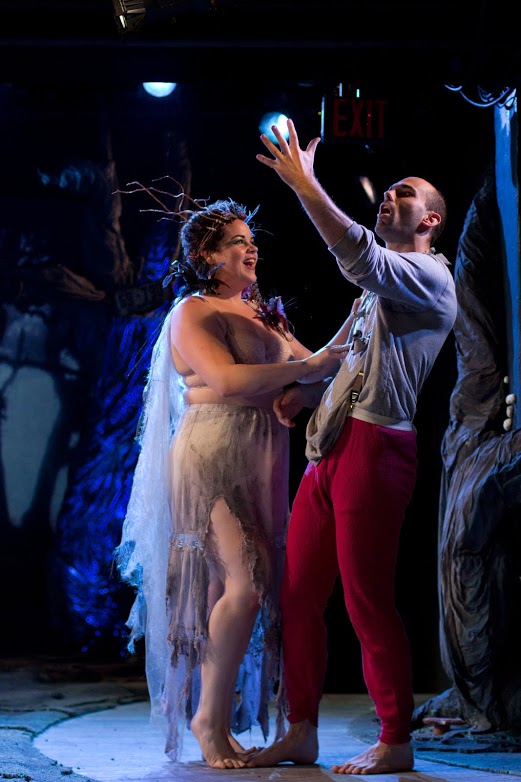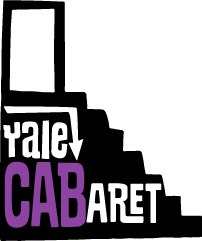Review of Midsummer at Yale Summer Cabaret
One of the plot points of Shakespeare’s A Midsummer Night’s Dream is a “changeling boy” that the fairy realm’s rulers—Oberon and Titania—battle over. The myth of the “changeling” refers, generally, to a fairy child substituted for a human child, so that parents find themselves raising a bizarre being not of their own. What the fairies do with the child they “adopt” is another matter. Doubtless, it becomes something wholly other, a strange hybrid of human and fairy.
Midsummer, the adaptation of Shakespeare’s play by director Sara Holdren and dramaturg Rachel Carpman, now playing at the Yale Summer Cabaret, is itself a hybrid, a strange change upon MND that might be seen as what would happen to the play if the fairies get a hold of it.
Midsummer often seems very much like the familiar play—one of the most oft-performed of Shakespeare’s comedies—and sometimes feels like a fever dream comprised of Shakespearean taglines on a ground of shifting unrealities. And that’s because Midsummer makes free use of Shakespeare’s oeuvre to match the word to the deed. (There’s even a drinking game advertised on the audience’s tables that recommends size of sips in response to recognized lines from various plays.) In short, it’s a trip.
This “Midsummer” begins with Puck (Shaunette Renée Wilson) brooding on how things used to be—the world was a much more enchanted place, once upon a time. A sprite more in sorrow than in spite, she soon decides to amuse herself and us by devising ways to bedevil a troupe of hapless actors gathered in the wood to rehearse a play. That play, it soon develops, will not be Pyramus and Thisbe (as in MND) but the story of the lovers of MND: the erotic travails of Lysander (Christopher Ross-Ewart), Hermia (Josephine Stewart), Demetrius (Leland Fowler), and Helena (Elizabeth Stahlmann). The transition from the hamfisted actors bumbling through their lines to the full enactment of their MND roles is only the first of many magical transformations the night offers.
The usual plot development—that the rivals for Hermia become instead rivals for Helena, while the once simpatico women become bitter enemies—plays out here with more asperity than it often does. And that’s in part because Holdren and Carpman get to cherry-pick Shakespeare to provide dialogue for these fools for love. While the changeableness of male affection is the theme Shakespeare’s text treats of with a certain arch candor, the handling of it here is full of surprisingly distraught energy—in Stewart and Stahlmann—and outrageous wooing and rejecting from Fowler and Ross-Ewart. It’s funny and physical, and lets us know that love hurts. Lurking in the wings, as it were, is every heartbroken teen who loved and missed, and Holdren gets her young cast to milk that for all its worth.
Meanwhile, there’s the centerpiece event: the enchantment of Bottom—who traditionally is given an ass’s head—and the passion for him created in Titania by “love-in-idleness,” a magical flower. That part of the story feels more allegorical than the rest, in MND, and here it’s almost beside the point. We’re much more beguiled by Titania (Melanie Field) and Oberon (Niall Powderly) facing off with magical bolts and scary voices like wizards in Harry Potter, so that the sport with Titania that Will seems to delight in gets upstaged by a parental stand-off over a child that feels more revealing.
Bottom the weaver, played with mercurial flair by Andrej Visky, is from the first the character most fully infused with the kind of wonderment that theatrical experience can provide. He’s ready to enact every part—including speeches from Hamlet spoken by the players and the prince. To give a sense of the range of this Bottom, I’ll mention that, as he wanders spooked in the woods, he breaks into “My Way,” and when he first discovers the sleeping Titania he says “she’s warm!” echoing Lear holding the recently deceased Cordelia.
The upshot of all this is that Midsummer creates a rich tapestry of Shakespearean verbiage as an overlay on a story of amateur theatricals, befuddled lovers, and spatting fairies. It’s not simply a re-imagining of MND, but a reassigning of Shakespearean lines and moments to create a lively variety that never ceases to surprise and delight. And those not so versed in their Bard needn’t feel left out, as there is a remarkable seamlessness to most of the juggling, except when it’s meant to be noticeable.
In the midst of the sheer love of Shakespeare’s words—as, as it were, non-character-specific poetry—Midsummer manages to make us aware of the varying levels of acting as entertainment. If Shakespeare’s comedies tend to be much ado about nothing, Midsummer insists that what Hamlet calls “the purpose of playing” is not so much holding a mirror up to nature but rather to play Prospero with what reality provides—and all actors are changelings. The strong suggestion is that we have at last gotten the play of Bottom’s dream, which hath no bottom. At evening’s end the players within the play troop off, considering what to call their play, riffing on Shakespeare, O’Neill, and others.
Finally, a mention of a remarkable set comprised of trees of twisted fabric and of seemingly real stone, wonderful projections that create worlds within the world, sound effects and special effects to give reality to the magical duels and spells, and costumes that let the cast move from clownish workers to lightly garbed youths and painted and fleshy fairies—to say nothing of Puck’s hybrid habiliments that seem more Caliban than Ariel. And Andrew F. Griffin’s lighting design is a poem in itself.
Midsummer plays through Sunday night. If you’ve already seen it, go again, and if you haven’t, do.
Midsummer
Based on A Midsummer Night’s Dream and the plays of William Shakespeare
Adapted by Rachel Carpman and Sara Holdren
Directed by Sara Holdren
Scenic Design: Christopher Thompson, Claire De Liso; Costume Design: Fabian Aguilar; Lighting Design: Andrew Griffin; Sound Design: Sinan Refik Zafar; Projection Design: Rasean Davonte Johnson; Dramaturg: Rachel Carpman; Stage Manager: Victoria Whooper
Ensemble: Al the Upholsterer/Titania: Melanie Field; Snout the Tinker/Demetrius: Leland Fowler; Peter Quince/Oberon: Niall Powderly; Flute the Bellows Mender/Lysander: Christopher Ross-Ewart; Snug the Joiner/Helena: Elizabeth Stahlmann; Starveling the Tailor/Hermia: Josephine Stewart; Bottom: Andrej Visky; Puck: Shaunette Renée Wilson
Yale Summer Cabaret
217 Park Street
June 4-June 21, 2015







